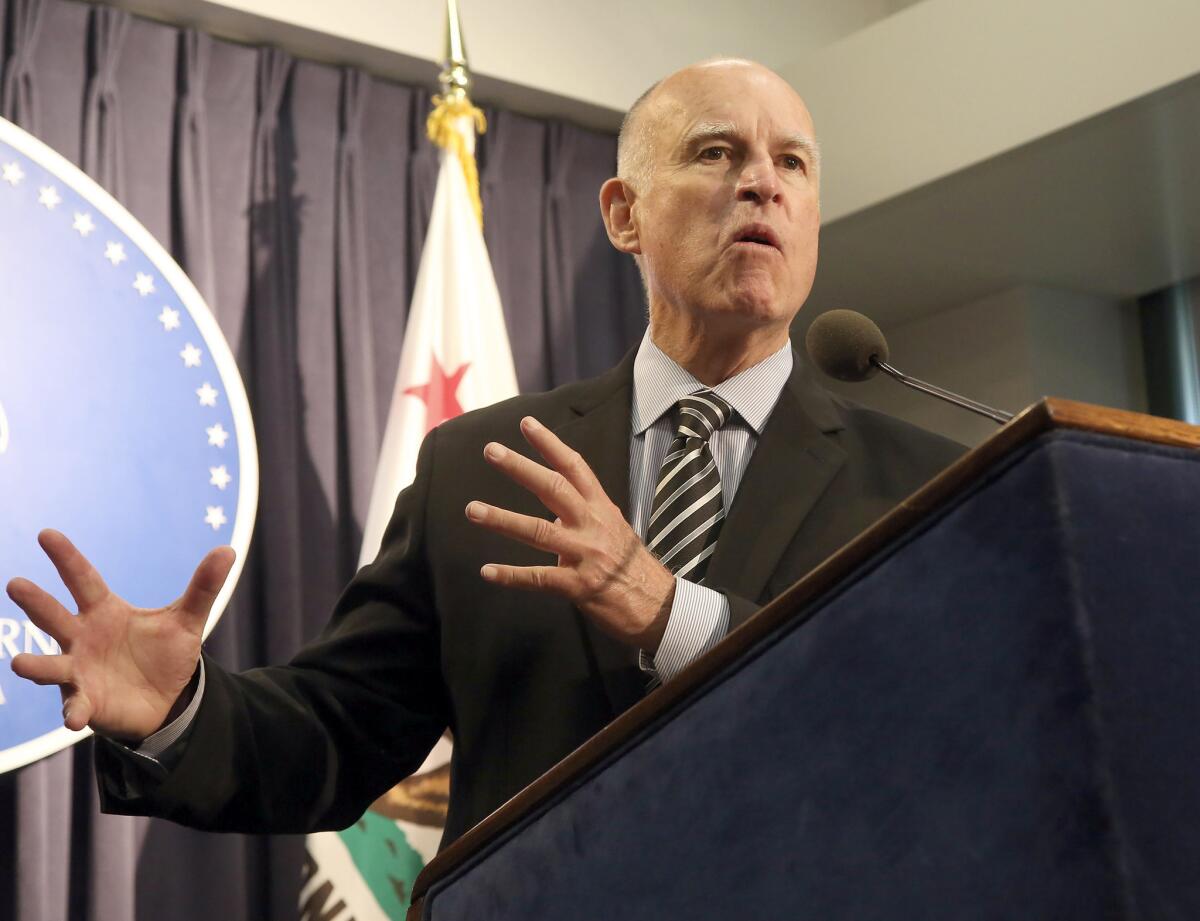California mandates new high school lessons to prevent sexual assaults

California Gov. Jerry Brown signed a bill Thursday aimed at reducing sexual assaults by requiring high schools that mandate health courses to provide lessons aimed at preventing sexual violence.
- Share via
Reporting from Sacramento — Amid concerns about sexual assaults on college campuses, Gov. Jerry Brown on Thursday signed a bill requiring high schools that mandate health courses to provide lessons in the prevention of sexual violence.
The measure also requires lessons promoting affirmative consent before couples engage in sexual relations.
“I firmly believe that by instilling in young minds the importance of affirmative consent and relationships built on love and respect, that we can reduce the sexual violence inflicted on young women,” said state Senate leader Kevin de León (D-Los Angeles), co-author of the bill with Sen. Hannah-Beth Jackson (D-Santa Barbara).
NEWSLETTER: Get essential California headlines delivered daily >>
The law is the first of its kind in the nation, according to the legislators, and follows a measure signed last year requiring college campuses to improve policies to prevent sexual assault and to require that couples affirmatively consent before engaging in sex.
“Without … action, more than 100,000 students will be sexually assaulted on college campuses nationwide,” said Sofie Karasek, co-founder of the group End Rape on Campus. “By passing this bill to educate high school students about consent, California is taking a critical step towards lowering that number.”
The governor signed a related bill requiring students to take sexual health classes unless their parents object, expanding lessons in HIV prevention and requiring the teaching to be inclusive of different sexual orientations. Sex education classes are currently voluntary.
Brown also approved legislation encouraging that future history textbooks for public schools include a section on the 1930s deportation of more than 1 million U.S. citizens of Mexican descent.
“With our state being the home to so many successful Mexican Americans, our children and all Californians should be aware of the injustices that took place so long ago,” said Assemblywoman Cristina Garcia (D-Bell Gardens), author of the measure.
The idea for the bill was submitted by a fifth-grade class at Bell Gardens Elementary School.
A bill intended to make it easier for poor Californians to receive dental care at free clinics also received the governor’s approval. It will allow dental students in their final year of study to provide some treatments at health fairs and other events that typically draw thousands of patients.
Other bills Brown signed include two aimed at helping the transition of prison inmates who were wrongly convicted.
One increases compensation for innocent persons who were wrongly convicted from $100 per day behind bars to $140, to reflect inflation. The other provides housing, job training and mental health services to those released from prison after being exonerated.
Assemblyman Reginald Jones-Sawyer (D-Los Angeles) introduced the second bill in response to the case of Obie Anthony, who spent 17 years in prison for a crime for which he was later exonerated.
Brown used his veto pen, however, on another Jones-Sawyer bill. It would have required courts to inform defendants about the consequences of pleading guilty to a felony — for example, becoming ineligible for some government services and finding difficulty getting jobs.
The legislation was intended to prevent Californians from accepting plea bargains without a full understanding of how it would affect their lives.
Brown said in a veto message that informing defendants about the consequences of guilty pleas was the responsibility of defense lawyers, who are “best situated to determine which advisements are appropriate and meaningful.”
Twitter: @mcgreevy99
Twitter: @chrismegerian
ALSO
Teenage son is charged in deaths of family found in burned cabin
Overturned truck spills hot asphalt on 71 Freeway, blocking all southbound lanes for hours
California commits to health care for immigrants here illegally. Will nation follow?
More to Read
Get the L.A. Times Politics newsletter
Deeply reported insights into legislation, politics and policy from Sacramento, Washington and beyond. In your inbox three times per week.
You may occasionally receive promotional content from the Los Angeles Times.












